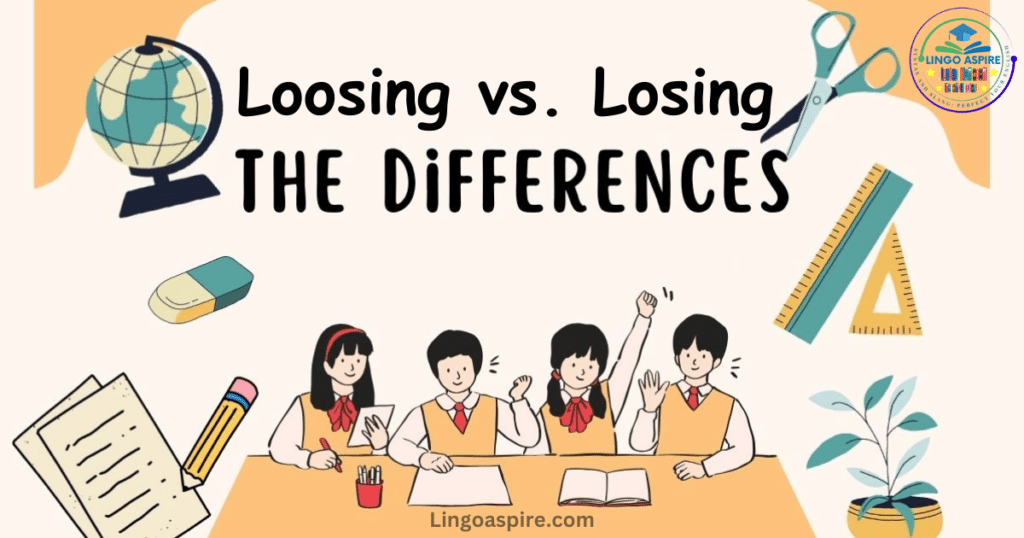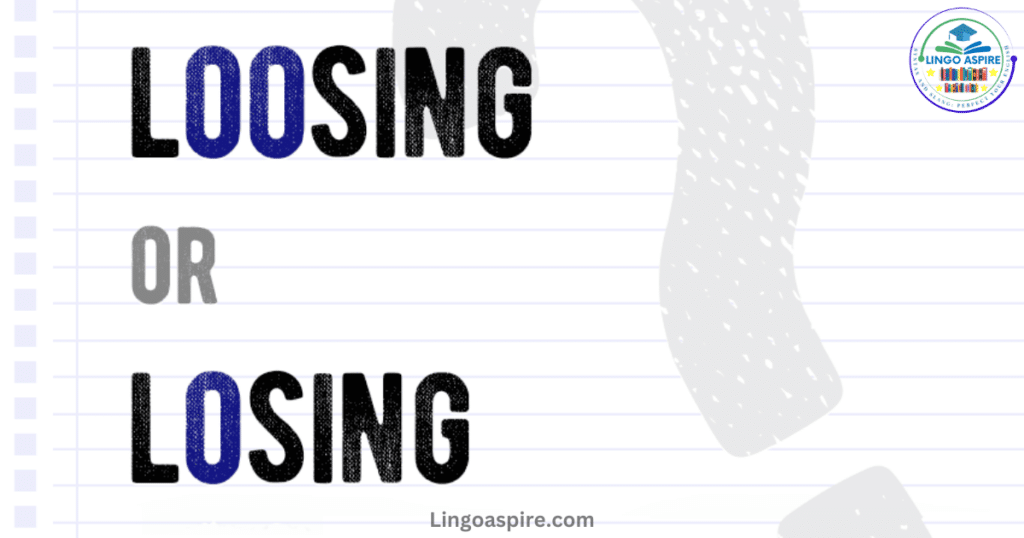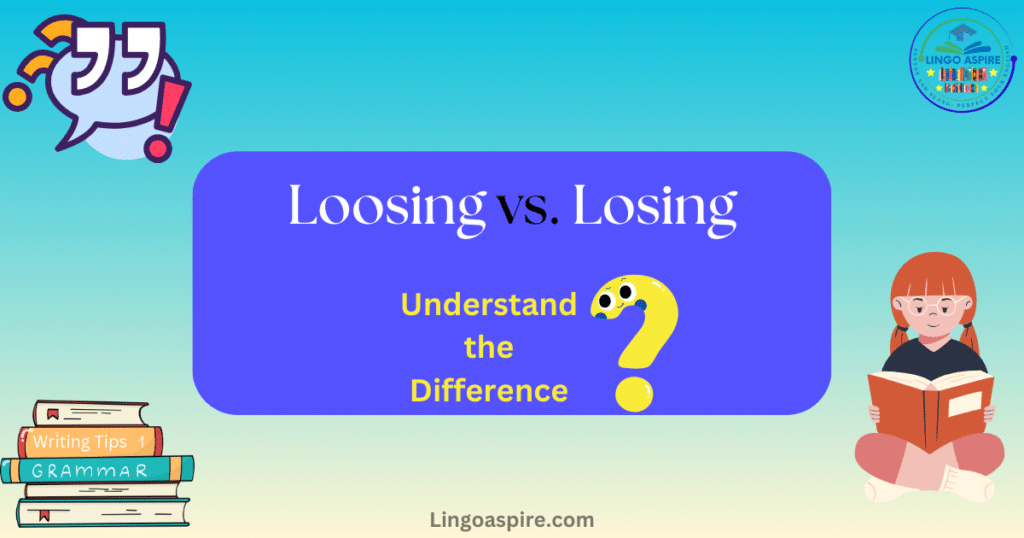When writing, loosing vs. losing can easily confuse people. Both words look similar, but they have distinct meanings. Understanding the difference between “loosing” and “losing” can help you improve your writing and avoid common mistakes. In this post, we will break down the meanings, correct uses, and ways to remember these words, providing examples and tips to make sure you’re always spelling them right.
What is “Losing”?
The word “losing” refers to the act of failing to keep, win, or maintain something. It’s commonly used when talking about something that is lost, whether it’s a physical object, a game, or an abstract concept like confidence. It’s one of the most widely used verbs in the English language and appears in various contexts, including sports, personal life, and even emotional or mental states.
For example, when someone loses their keys, you would say: “I am losing my keys.” Similarly, in sports, a team that doesn’t win a match is losing: “The team is losing the game.” This usage relates to losing as a result of not having something or failing to keep it.
In relationships, we also talk about losing things, like trust or connection. “He is losing trust with his friends” shows how losing can go beyond physical objects. This wide range of applications makes losing a very common word, and it’s essential to get the spelling right.
What is “Loosing”?
On the other hand, “loosing” has a different meaning. It refers to making something loose, untied, or free. This word is less common than losing, but it’s still important to know its correct use. For instance, when someone untangles a knot or frees an object from being tied down, they are loosing it.
One example could be: “He is loosing the knot from the rope.” Another example might be: “I am loosing the dog from its leash,” where you’re making the dog no longer tied. Loosing is about removing tightness or control, whereas losing is about no longer having something or failing to retain it.
While the word loosing may not appear as frequently as losing, it’s still essential to understand when and how to use it. You might come across loosing in specific contexts, like in the expression “loose the reins” or “loose ends,” both of which suggest freeing something.
The Key Difference Between Loosing vs. Losing

The core difference between “loosing” and “losing” is that “losing” is about loss and failure, while “loosing” is about releasing or making something loose. If you think about it this way, it can be easier to remember which word to use.
For example, losing might be something like losing your wallet or losing a game. This relates to something that is no longer in your possession. In contrast, loosing would be about freeing or untangling, such as loosing a rope or loosing a tied dog.
This simple difference can help clarify when to use one word or the other. Just remember: “losing” involves something going missing, and “loosing” involves making something loose.
Common Mistakes with “Losing”
One of the most common mistakes people make is using “loosing” when they mean “losing.” This happens because the two words are so similar in spelling and sound. People might write sentences like “He is loosing his job,” when they should say, “He is losing his job.”
This mistake can also happen in sports writing. For example, someone might write: “The team is loosing the match,” which is incorrect. The correct sentence should be: “The team is losing the match.” By recognizing the difference, you can avoid this mix-up.
Another common mistake happens when people use “loosing” in emotional contexts. For instance, “She is loosing her confidence” should be “She is losing her confidence.”
Common Mistakes with “Loosing”
On the flip side, using “losing” instead of “loosing” is also a common error, although it happens less frequently. People might write something like: “I am losing the knot,” which doesn’t make sense because you’re not losing the knot; you’re loosening it. The correct term here is “loosing.”
When you refer to a dog that has been untied, saying “The dog is losing from the leash” is wrong. It should be: “The dog is loosing from the leash.” This mistake happens because many people mistakenly think both words are interchangeable when they are not.
How to Remember Loosing vs. Losing
One of the best ways to remember the difference is by connecting each word to its meaning. Losing involves loss, so think of the “i” as representing something you are “in” (such as being in a state of loss). When you lose something, you are no longer “in” possession of it.
Loosing, on the other hand, involves making something loose. The “o” can remind you of something that is open or not tied down. By associating the two words with these concepts, you can make the distinction easier to remember.
It might also help to think about the more common word, losing, as always related to a negative outcome, like losing a race or losing an object. Loosing, by contrast, has a more physical, tangible action associated with it.
Usage of Loosing vs. Losing

Here’s a table summarizing the usage of “loosing” and “losing” in different contexts:
| Word | Meaning | Correct Usage | Example Context |
|---|---|---|---|
| Losing | To fail to keep something; to be defeated | “The team is losing the game.” | Defeat in sports or games |
| Losing | To misplace something; to no longer have something | “I am losing my keys.” | Misplacing personal items |
| Losing | To suffer a loss or decline | “She is losing her patience with the delay.” | Suffering a loss (emotional, patience, etc.) |
| Loosing | To make something less tight; to untie or release | “He is loosing the knot on the rope.” | Untying or releasing something |
| Loosing | To release or set something free | “They are loosing the bird back into the wild.” | Releasing animals or objects |
| Loosing | To make something less tight or less secure | “She is loosing the screws to remove the lid.” | Loosening something (tightened object) |
Examples of “Losing” in Various Contexts
To fully understand losing, it’s important to see how it works in different contexts. In sports, losing is a common situation. For instance, if a team isn’t winning a match, we say, “The team is losing.” Another common example is in losing possessions. If you can’t find your phone, you’d say, “I am losing my phone.”
In personal development, you may hear people say: “I am losing my motivation.” This means they are failing to keep their drive or focus. Similarly, someone might say they are losing confidence, which refers to the decline of their belief in themselves.
Examples of “Loosing” in Various Contexts
In contrast, loosing is typically used in physical actions. If you are untangling a rope, you might say, “I am loosing the rope.” Similarly, if you are untying a knot, you would say, “I am loosing the knot.”
Another context for loosing is when you release or free an animal. For example, you could say, “I am loosing the dog from its leash,” which means you are making the dog no longer restrained.
Synonyms of Loosing vs. Losing
Here are some synonyms for “table” that can be used in different contexts:
- Chart – A visual representation of data, often in rows and columns.
- Grid – A network of horizontal and vertical lines used to organize information.
- Matrix – A structure of rows and columns used to organize data, often mathematical.
- Schedule – A listing of events or tasks, often presented in a grid or tabular format.
- List – A series of items or data presented sequentially, which can sometimes take the form of a table.
- Diagram – A simplified drawing showing the structure of something, often used to organize information.
- Spreadsheet – A digital format for organizing data, typically using a table-like structure (like Excel).
Spelling Tips to Avoid Confusion
The best way to avoid confusing “loosing” and “losing” is to remember that “losing” involves loss and “loosing” is about making something loose. This small difference can help you decide which word to use in a sentence.
Also, always remember that losing is the more commonly used word. If you’re ever unsure, try thinking about whether the sentence relates to something disappearing or something being freed or untied. That can quickly guide you to the right choice.
How to Avoid Loosing Vs. Losing Mistakes
To avoid mixing up loosing and losing, practice by reading sentences out loud. When you say the sentence, does it make sense with losing or loosing? If it’s about failing to keep something, use losing. If it’s about releasing or untangling, use loosing.
Another tip is to check for context. If you’re writing about a contest, a sport, or anything related to something being lost, you’ll likely need losing. If it involves something being released or untied, loosing is the correct word.
Conclusion
In summary, understanding the difference between “losing” and “loosing” is essential for clear communication. Losing relates to loss, whether it’s something physical or emotional, while loosing refers to freeing or untangling something. By using the correct word in the right context, you can avoid common mistakes and improve your writing. Always remember the simple rule: if it’s about loss, it’s losing; if it’s about making something loose, it’s loosing.
Sources
Here are three reliable sources that can further enhance your understanding of the difference between “loosing” and “losing”:
- Merriam-Webster Dictionary: This authoritative source provides detailed definitions and usage examples for both “loose” and “lose”, which will help clarify the meanings of “loosing” and “losing.” It also explains the differences between the words in terms of grammar and usage.
- Oxford English Dictionary: As one of the most reputable dictionaries, Oxford offers precise definitions of both “losing” and “loosing”. It can help explain the grammatical rules and contexts where each word is appropriate.
- Grammarly Blog: Grammarly offers helpful tips and examples of how to avoid common mistakes like using “loosing” when you mean “losing.” The site is a great resource for practical writing advice, including discussions on common grammar issues.







